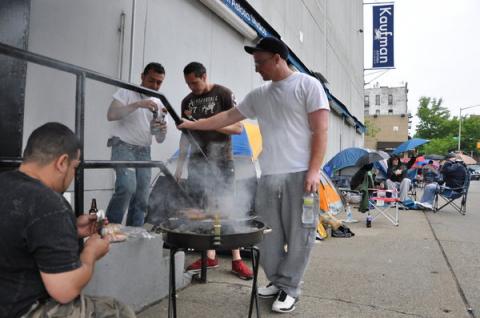The men began arriving last Wednesday, first a trickle, then dozens. By Friday there were hundreds of them, along with a few women.
They set up their tents and mattresses on the sidewalk in Long Island City, Queens, unpacked their Coronas and cards – and settled in to wait as long as five days and nights for a slender chance at a union job as an elevator mechanic.
On Monday morning, Local 3 of the International Brotherhood of Electrical Workers would hand out applications for its training program. Those in line – there were more than 800 by sun-up Monday — were hoping for a chance at job security, higher salaries and other benefits.
Andres Loaiza, 25, had his eye on a position that includes minimal physical labor.
By Monday morning, the line had swelled to more than 800 people.
“I want to get to that point where I would troubleshoot and not kill my back anymore,” said Mr. Loaiza, who currently does nonunion electrical and mechanical elevator work. And the union, he added, looking years down the road, would provide college funding for his son, who is now 4.
Every 18 to 20 months, the union accepts 750 applications for the 150 to 200 spots in its four-year apprenticeship program, distributing them from the second-floor office of its elevator division on 36th Street. Those who pass a test and are accepted start out making $17 an hour. If they complete the program, which includes college-level classes, they become journey workers, making $35 to $40 an hour with pensions and full medical benefits.
While they waited, the hopefuls lined the sidewalk along 36th Street, across from people drinking beer at Studio Square, past the Astor Room pumping jazz fusion from its speakers, and along the huge building of Kauffman Studios, where one morning some men said they were given leftover breakfast originally intended for the movie studio’s extras.
The union had rented six port-a-potties and hired a 24- hour security guard. The police from the 114th Precinct stopped by to ensure order. Moving the process off the street would not have made things much easier for the union, said Nicholas LaGuardia, director of the union’s elevator division.
“If we did it online or we did it like a mail-in, we’d have to go through 10,000 applications,” he said.
While the job seekers came prepared with dominoes, iPhones, camping lights and tarps, by Friday many of them were bored, pacing. Overnight, they brushed their teeth with bottles of water; tucked into their sleeping bags, folding chairs or cars; and tried to get some rest.
On Saturday as a light drizzle fell, four new friends leaned over a camping grill with sizzling burgers and sausages that they bought from a nearby grocery store, which had also opened its bathroom to them.
Gerry Dubatowka, 20, whose father is in Local 3, had come down from Orange County, N.Y., to wait for his shot. He is studying electrical technology at Orange County Community College, but said he would rather work with his hands than be in school.
“I just want to do whatever, wherever I got to start,” said Mr. Dubatowka. “I want steady work all the time.”
Mr. Dubatowka met Mr. Loaiza and two other men, Carlos Ramirez, 23, and Edwin DeLeon, 38, waiting in the line. Soon, they started referring to one another as neighbors with rent-stabilized homes on the sidewalk, though Mr. Dubatowka actually spent nights in his car.
After Sunday’s drenching rain, Monday morning dawned gray. A few arguments erupted as people tried to cut the line. A security guard yelled not to take up the whole sidewalk.
“I’m going to spend the next four days in the shower,” Mr. Dubatowka promised.
At 9 a.m. Monday, the door opened. The first man in line disappeared inside and emerged moments later with a wide smile across his face.
“Yay! No. 1!” one man yelled when he stepped onto the sidewalk.
“Good luck, big guy!” said another. He cheered, throwing both hands into the air, one clutching the paperwork. A moment passed before a union representative brought things back to earth.
“Let’s go,” he said. “Move the line.”


Spread the word